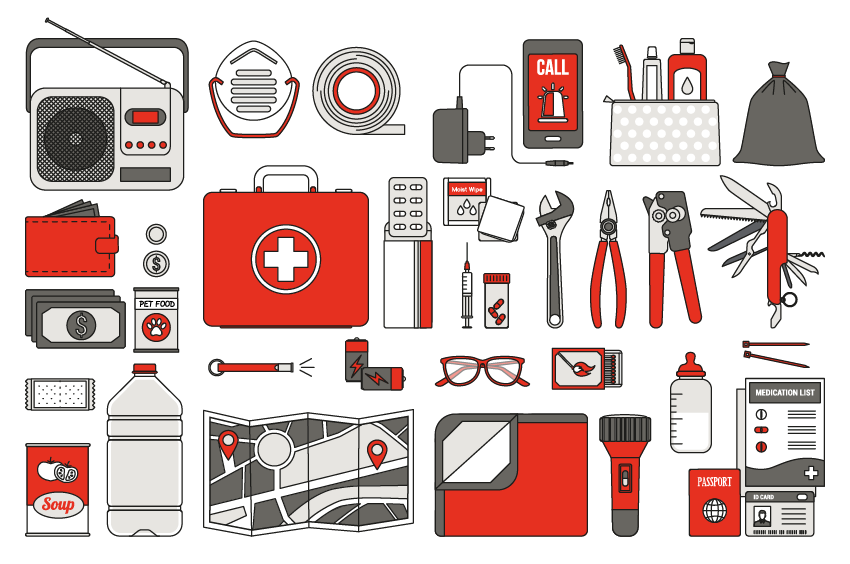
September 2023 THRIVE | Emergency Preparedness
Hello neighbors!
What a stunning summer it’s been, especially considering the extreme heat experienced virtually everywhere else in the country. But our community has not wholly escaped the consequences of hot dry conditions– as I write, the Sourdough fire is not expected to be contained until October; I just spoke with partners about relief funding for small businesses that have been affected. Meanwhile, the devasting consequences of Maui’s tragic wildfire continue to unfold – as do the heartening stories of a community rallying in response. It’s yet another reminder of our humanity, and our fragility. We need each other.
September is emergency preparedness month.
Let’s get ready!

Mauri Ingram,
President & CEO
COMMUNITY CHALLENGE
Preparing for Whatcom County’s next emergency.
In the last three years, our county has endured a global pandemic, a historic flood, a wildfire that has consumed more than 4,000 acres at this writing, and two summers of exceptionally smoky skies from nearby wildfires. Each of these events has unique challenges; all require that we stress test our public and private sector systems, including communication and coordination capabilities.
As a community, we learn from each crisis: we now test wastewater as an indicator of public health. The Long-Term Recovery Group (LTRG) now exists as a permanent body dedicated to disaster response and recovery. Last month, a coalition of nonprofit agencies launched an online directory of countywide social, human and health resources. Local jurisdictions, to the degree that they can with limited resources, develop and drill resilience plans.
This is good news. Yet recent experience tells us that our community could be much better prepared – to give people dislodged from their homes immediate and acceptable temporary shelter for example, to feed families who rely on school meals when their school unexpectedly shuts down, to aid small businesses struggling in the face of disaster, or to coordinate critical information flow to everyone who needs it.
Pacific Northwesterners have long been urged to prepare for “the big one,” an inevitable earthquake and possible tsunami whose timing is vague enough to foster a degree of complacency. But earthquakes aren’t the only thing to plan for anymore, and complacency doesn’t cut it in a world where weather extremes are rising.
As individuals our preparation often corresponds with personal experience: people who’ve been through a pandemic more routinely wear masks to protect themselves and others. Earthquake veterans keep a go bag. Those who have been through a flood are more likely to waterproof their basement. All good as far as it goes, which is not far enough.
One of our favorite examples of emergency preparation comes from the Community Foundation’s first round of Project Neighborly grants. Neighbors in Sudden Valley came together in the name of fire protection, renting a chipper and spending a fun and productive weekend clearing the land around their homes of flammable vegetation. They prepared themselves in two ways: first, by reducing the threat of fire, and second by getting to know one another — which increases coordination and care in good times and bad.
After three major events in three years, these are our three major takeaways:
- Those already farthest from opportunity are generally the hardest hit.
- We are only as strong as our neighbors, who are often the first to administer (or need) help in a crisis.
- Local, philanthropic dollars are the most flexible, first-on-the-scene funding.
What the Whatcom Community Foundation is Doing
Getting our own house in order: by developing a resilience plan, addressing continuity of operations, key documents and contacts, communications planning and decision-making hierarchies with a bias for action.
Building the Resilience Fund: because it’s working.
Working with partners to improve response time and recovery processes. For example, the Community Foundation helped fund the implementation of a platform for disaster case management at the LTRG that prioritizes speed, security and accuracy in facilitating access to public resources.
Raising awareness about disaster planning and preparation, including through this newsletter, social media campaign and outreach with community partners, such as with school districts to enhance communication with families regarding disaster planning.
How You Can Help
Prepare your household. See links below for guidance.
Know your neighbors. Tune into neighborhood associations; plan an event, attend one or simply stop to visit and exchange names and contact information. Extra credit: develop a project and pitch it to us for grant funding.
Follow us on Facebook, Linked In, Instagram for tips all month on preparing your household.
Visit our resource page.
Make a modest monthly donation to the Resilience Fund if your resources permit.
Deeper Dive
Local government readiness
Whatcom County
City of Bellingham
Should We Stress Test our Local Governments? There is room for innovative, problem-based learning on disaster and climate governance.
“I’m mad that we didn’t do some of the things that we could have done three, five, seven years ago to make an incident like this relatively impossible.” Hawaii governor Josh Green.
Readiness at home
Family Emergency Planning
Make a Plan
Red Cross Survival Kit Supplies
Readiness at work
Small Business Administration
Ready.gov
Readiness for specific groups
Rural areas
Schools
Older adults
People with Disabilities
Affordable housing advocates:
Build with Natural Disasters in Mind
Disasters Can Wipe Out Affordable Housing Forever Unless Communities Plan Ahead
Mobile home parks uniquely at risk
Regional issues
Everson floods: America’s Towns are Not Ready for Climate Disaster. Here’s how one is hanging on. (NBC)
Atmospheric Rivers Spur Debates on Flood Management in Washington State
View the THRIVE Newsletter as e-mailed on 9/14/2023 HERE>





No Comments